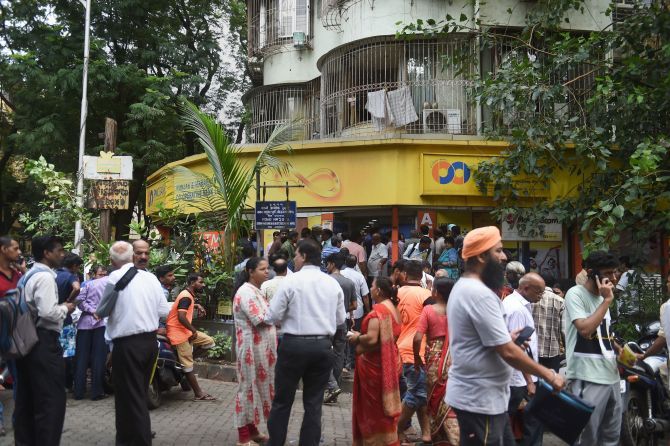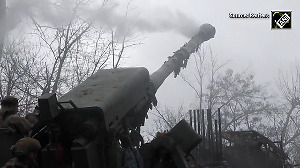'What is critical today in India is confidence of depositors.'
'If you have these kinds of problems spreading like this, the confidence level of a lot of people in the system gets shaken.'

Punjab and Maharashtra Co-operative Bank customers believed their bank had gone bust all of a sudden on Tuesday, September 24, 2019.
To their utter shock and disbelief, many of them who came to the bank's branches in the morning were told that they could not withdraw money.
The only respite they got was that they could withdraw Rs 1,000 from their account, but this was only once in six months. Many of them found the move many times worse than the demonetisation of November 2016.
The curbs on the PMC Bank were imposed by the Reserve Bank of India following the discovery of many regulatory lapses, including massive under-reporting of non-performing assets.
Faced with such a grim situation where your life savings have been locked up, what can the poor customer do?
"One has to take into consideration the problems of small depositors and senior citizens. When you cannot withdraw your own money you face serious hardships which need to be resolved (by the RBI)," Sunil Bhandare, president, All India Bank Depositors Association, tells Rediff.com's Syed Firdaus Ashraf.
As a depositor what do you do when your bank goes bust?
There is a major problem for them and this has been there as and when banks collapse. The only thing is that whatever the Reserve Bank of India prescribes in terms of regulations, and in Punjab and Maharashtra Co-operative Bank they are saying they will restrict withdrawals to Rs 1,000 per account (in six months). This causes tremendous hardships, but one appreciates that urgency of this action.
One has to take into consideration the problems of small depositors and senior citizens. In many cases their hard-earned money was kept in the bank for safety and security. And when you cannot withdraw your own money you face serious hardships which need to be resolved (by the RBI).
In this kind of scenario, what the RBI probably needs to do is to see if under the existing Deposit Insurance and Credit Guarantee Corporation of India they have at least insured the deposits of Rs 1 lakh for every depositor (external link).
Is it not the rule that banks have to give Rs 1 lakh to depositors even if they go bust?
Those rules and regulations, whatever they are, require to be modified and amended. Once it is clear that a particular bank has undertaken insurance of their deposits, at least the insured amount of deposits should be released to the Deposit Insurance and Credit Guarantee Corporation.
That requires a change in certain rules and regulations. On amendment of the DICGC Act, up to Rs 1 lakh can be released when such episode happens in any particular bank.
And subsequently when the RBI inspection and audit happens, then it can be seen what is the status of the bank, whether it has to go to solvency position or whether it can be restored.
Once it is ascertained, that the remaining part of the deposit of more than Rs 1 lakh relief has to be given, which is required based on certain formula.
We are repeatedly taking this up with the RBI saying this deposit limit has to increase to Rs 5 lakh as this limit of Rs 1 lakh was prescribed in 1993. Considering the inflation now in 2019, that amount has to be Rs 5 lakh.
Right now if you are told to withdraw only Rs 1,000 from your bank, you suddenly become helpless and don't know what needs to be done.
What is the maximum deposit amount insured by the DICGC?
Each depositor in a bank is insured up to a maximum of Rs 100,000 for both principal and interest amount held by him in the same capacity and same right as on the date of liquidation/cancellation of the bank's licence or the date on which the scheme of amalgamation/merger/reconstruction comes into force.
So if Rs 1 lakh insurance is the rule, how can the RBI not allow depositors to withdraw that amount from the PMC Bank? Isn't this move by the RBI illegal?
This may not be illegal. The point is, under the DICGC Act there are all kinds of ifs and buts. There are sub-clauses saying that once the bank comes into a certain position, then only Rs 1 lakh worth of deposit insurance has to be paid.
There are issues on settlement to be paid. I think that is where the DICGC has to be more pro-active, the RBI will have to be more pro-active and the ministry of finance has to be more pro-active.
What is critical today in India is confidence of depositors. We are having all kinds of episodes in the last year or so starting from the crisis in NBFCs, IL&FS and thereafter others.
If you have these kinds of problems spreading like this, the confidence level of a lot of people in the system gets shaken.
It is not a one off episode, as it is happening in different areas of the financial sector.
The PMC Bank had built up its reputation and that reputation has suddenly been shaken. We ourselves were surprised by this news.
A news report say the Housing Development and Infrastructure Limited pulled PMC Bank down with a bad loan of Rs 2,500 crores. Why should ordinary depositors suffer for the mistakes of one company?
That is right, if this figure is true. For PMC Bank the Rs 2,500 crore loan is a fairly large amount by way of exposure.
I don't have the correct figures, but I think it will be 25 percent on the credit side. And if 25 percent of your credit portfolio gets suddenly impaired, then there is a major problem.
That is the reason we are very careful because we do not know the current position. Whether it is Rs 2,500 crore or more and how much of it becomes non performing assets. This information percolates to the press, but the RBI will not release such information and is not expected to do so.
What we suggest is that we need to look at co-operative banks differently. There has to be an increase in deposit insurance support. In case of public sector banks people have faith because it has sovereign guarantee as it is a government-owned bank.
Even public sector banks have high NPAs, so should their depositors wonder what will happen to their money if the banks go bust?
In case of public sector banks the only comfort point is that it is owned by the government to a large extent and the government will come forward (if there is trouble).
It is confidence in the government that gets lost if (public sector banks go bust).
In the case of co-operative banks, private banks or small banks, if something goes wrong, then faith in banking gets lost. These are two different dimensions.
Also, public sector banks mostly are very large. And the government will not allow large banks to fail.
Which is the safest bank in such times when panic strikes people?
There are so much of problems and I do not know what to suggest. What has happened is that because of falling interest rates for bank deposits, people shifted their money to non-banking financial companies and mutual funds and many of them have major problems now.
All mutual funds have not been successful and their investments have not been successful.
Financial literacy being what it is in India, people are not conversant with what kind of returns one gets in mutual funds.
There has to be some mechanisms by which the banking system has to give a sense of comfort for small depositors or senior citizens with a deposit of at least Rs 25 lakhs or so. They can keep their money with complete comfort and get some regular income from that.
Many cooperative banks go bust, so why do depositors keep their money with them?
There are a few cooperative banks which do extremely well. For example, Saraswat Co-operative Bank and a few others who are in the club, but the rest of them are an issue.
The inducement of half a percentage point is good enough for a large number of people who put their money in to get better interest rates.
We have suggested to the RBI that companies like CRISIL and ICRA are doing credit ratings of institutions, but not that of banks. So a risk-based insurance scheme can be provided to these cooperative banks.
Therefore, these cooperative banks will have high risk and therefore high deposit insurance cover, and hence protection can be extended to the depositors.
Have cooperative banks become political tools?
Undoubtedly so, these cooperative banks have become political tools.
There is also the issue of dual supervision. It means cooperative banks are subject to state government regulations and RBI supervision and regulation.
If there is unity of command in terms of supervision, there will be less conflict and the RBI will be able to take a much better and more effective supervision of co-operative banks.
Because state governments also do that simultaneously, there is a problem.











 © 2025
© 2025